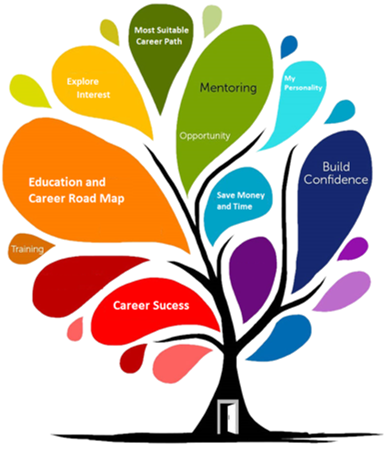Educational Vocational Coaching
Stuck? No More! Educational & Vocational Coaching. Unlock Your Future: Clarify Your Vision, Craft Your Path.
There are few things in life as important as getting an education that suits your talents and interests and choosing the right career path. Dr. Fay, OTR/L, OTD, MBA - Occupational Therapist is an experienced clinician who can help students and their families make the right decision.

CAREER COACHING BASED ON THE ANALYSIS OF PERSONALITY, APTITUDE, INTERESTS & EMOTIONAL INTELLIGENCE.
Ideal ages: 14+
WHAT IS INVOLVED?
I believe that my role is not just to help students gain acceptance to their top-choice colleges, but also to help them self-actualize on their path to becoming lifelong learners. I work with students to identify and highlight their strengths and interests, explore their passions, and develop a sense of purpose as they research programs.
The use of a Multimodal career counselling system (MCCS). The Session includes a 60-minute interactive work session with Dr. Fay Gersh, occupational therapist consultant, the completion of several questionnaires in-person or remotely, as well as my analysis, scoring, interpretation, and guidance for the next steps planning and support services. The student and his/her parents are then invited for a feedback session where the results will be presented to them and options and service packages will be discussed.
Why The NTS Method is Unique?
Unlike other career counseling services (e.g. school or employment counselling) which typically use one standard test, New Therapy Solutions offers a unique combination of specialized psychological tests (personality, aptitude, and interests) in conjunction with client-oriented psychological exploration. This system measures students' relative strengths in several aptitude areas, indirectly explores their personal interests and preferences, and assesses personality traits related to satisfaction in different work environments. Based on a thorough analysis of these results, the vocational areas that satisfy these three factors are then selected. In addition, the method offers client-centered guidance based on the identified career options and the current stage of the student in his/her career development.

The Process of Career Choice/Educational Coaching; The Five Stages
Stage 1: The Initiation Stage
The first stage of your coaching is known as the initiation stage. Here you will get to know Dr. Fay, and she will get to know you. It is vital to start building rapport with your chosen mentor or coach at this stage. Having a vocational coach you are comfortable talking to is extremely important!
Gathering of Data
Data needs to be gathered so that a picture of who you are can be built up. This is done in various ways, including interview documentation, questionnaires, and form filling. This part of the process may seem a little boring, but your coach it is imperative for me to understand just who you are now and where you have come from to reach where would like to be in the future.
Awareness
This is a critical element of the initiation stage. As I will know plenty about you. With this knowledge, I can start working towards steps and strategies to use throughout the remaining stages of the coaching therapy time productively.
At this stage, the rapport with me should be excellent, and you should feel relaxed and comfortable with your sessions.
Stage 2: The Exploration Stage
This analytical stage may include some tests, and you will have your social behavior assessed, as well as your personality and your career interests. With this information, it is time to move on to the next step. One-on-one interaction will allow you to discover which avenues and paths are open to you.
Stage 3: The Decision-Making Stage
This stage will explore different paths. Any barriers stopping you from choosing an educational career path will be ruled out. Proper coaching will explore which path is right for you.
Stage 4: The Preparation Stage
All avenues will have been explored at this stage, and decisions can be narrowed down. Now is the time to prepare a plan of action. This plan will allow you to go down your chosen route and succeed. Resources will be made available, and you will receive a backup plan.
Stage 5: The Implementation Stage
The final stage is the implementation of the plan. You will be given goals and deadlines to achieve. This is perhaps the most exciting stage for you, the most nerve-racking too! We will be hoping that all the hard work you have put in will get you to the place you want to be in your life and that you will no longer be stuck at a crossroads.
What Career Counseling Can and Cannot Do
Because of the fluid nature of the assessed characteristics, occupational testing cannot provide an ultimate answer for one's life career path. Career development is not a matter of making a single choice at a given point in time. It is often a difficult process that is complicated by the adolescent's limited self-understanding, meager knowledge of the world of work, and limited work experience. Occupational testing can stimulate and facilitate this process by exploring student's personal characteristics and matching them with specific work areas that may meet their interests and skill sets. It can be used as a vocational baseline starting point followed by a thorough exploration of the recommended occupations, projected industry job growth, training programs and requirements.
FEES:
- Full interest/educational vocational planning assessment - $3000 with a plan of action written report.
- Follow-Up 1:1 Sessions $200 per session
Assessment Services are fee for service. However, many clients may have coverage with their health benefits such as employee and private health insurance plans, which offer full or partial coverage for services provided by a registered occupational therapist. Additionally, consider looking into Occupational Therapy as a tax-deductible medical expense.
